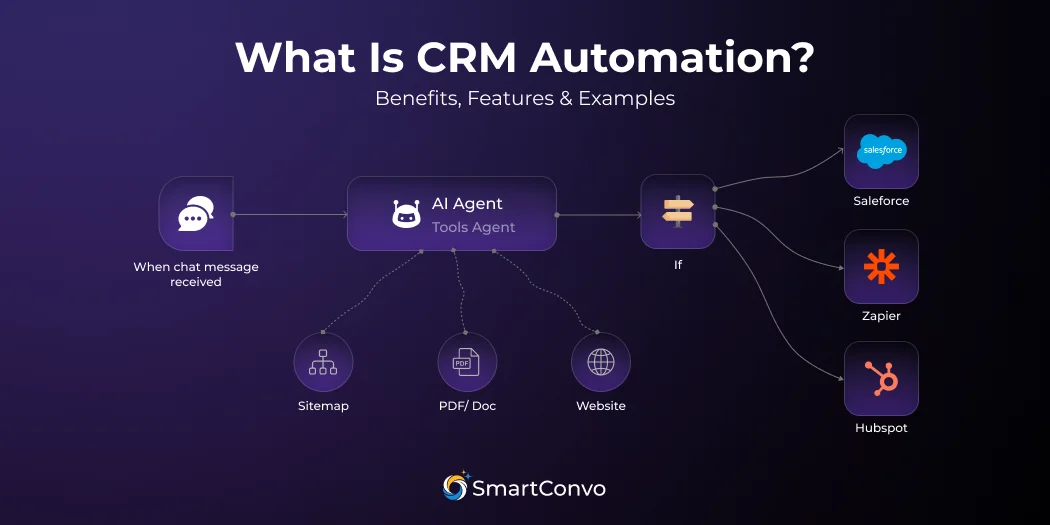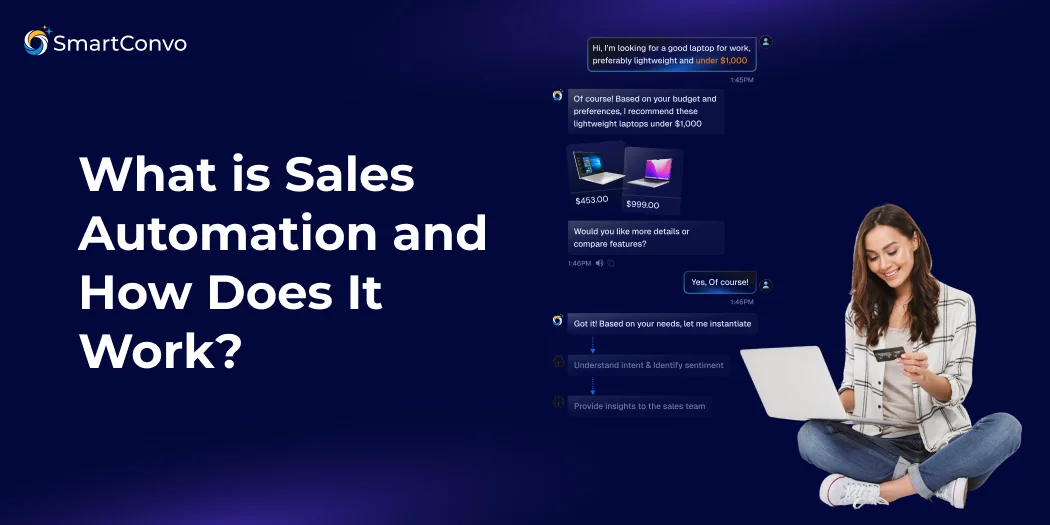Businesses today rely on data-driven solutions to work smarter and stay competitive. One powerful tool that’s transforming customer relationship management is CRM automation. But what exactly is CRM automation, how does it work, and why is it so important?
CRM automation uses technology to streamline and simplify repetitive tasks in sales, marketing, and customer service, allowing businesses to focus on building stronger relationships and driving growth.
Whether you’re managing a sales team, overseeing a marketing strategy, or running a business, understanding CRM automation is essential. This guide will walk you through everything you need to know—from What CRM automation is and how it works, to its key benefits, features, and real-world applications.
You’ll learn how it helps save time, improve efficiency, and personalize customer interactions. By the end, you’ll be equipped with the knowledge to choose the best CRM automation tools for your needs and seamlessly integrate them into your business processes, setting the stage for long-term success.
What Is CRM Automation?
CRM automation leverages technology to streamline and simplify tasks within a Customer Relationship Management (CRM) system. Think of it as your very own automated assistant that helps manage customer data, nurture leads, and optimize workflows.
This technology works behind the scenes, handling repetitive tasks like data entry, scheduling follow-ups, and sending personalized emails, saving your team hours of manual work. An automated CRM system not only frees your team from mundane tasks but also reduces human error, ensuring accurate and up-to-date records.
This allows your team to focus on what truly matters: building meaningful relationships with customers, identifying growth opportunities, and closing more deals. By automating routine processes, CRM automation empowers businesses to work smarter, boost efficiency, and enhance overall customer satisfaction.
CRM automation turns the complex process of managing customer relationships into an efficient, streamlined system that saves time and boosts productivity.
How Does CRM Automation Works?

CRM automation relies on a combination of tools and technologies to handle repetitive tasks and optimize your workflows. Here’s a breakdown of some core processes driving every automated CRM system:
1. Database Integration
A CRM automation system works by keeping all your customer information in one place. It combines data from sources like social media, email, and website analytics, so your team can easily see everything about a customer or lead in one view.
2. Trigger-Based Actions
Trigger-based actions in CRM systems ensure proactive customer engagement. For example, an automated email or SMS could be sent to a lead who completes a form on your website. These actions guarantee the immediate follow-up necessary for successful conversions.
3. Workflow Orchestration
CRM automation software helps organize workflows by defining sequences of events. For instance, when a lead enters the system, they can be automatically assigned to the right team member, categorized based on lead scoring, and enrolled in tailored email campaigns.
4. Analytics and Optimization
CRM automation doesn’t stop at facilitating workflows. It provides powerful analytics tools to measure the performance of campaigns, track success metrics, and identify opportunities for improvement.
Key Features of CRM Automation

To understand how CRM automation works in practice, consider these essential features that streamline business processes, enhance customer relationships, and improve overall efficiency:
1. Automated Data Entry
Instead of spending hours entering customer details manually, CRM automation takes the hassle out of data management by capturing and logging all relevant information from emails, calls, and other interactions effortlessly.
2. Lead Scoring and Segmentation
CRM automation services leverage advanced AI to score leads based on their likelihood to convert, analyzing factors such as engagement history, behavior patterns, and demographic data. These tools then segment prospects into highly specific groups, allowing businesses to deliver personalized interactions and targeted marketing campaigns.
3. Email and SMS Campaigns
Automated CRM systems can send personalized communication through email and SMS campaigns, ensuring that messages are tailored to individual customer preferences. By analyzing customer behavior and engagement patterns, these systems can schedule messages at the most optimal times, increasing the likelihood of meaningful interactions.
4. Workflow Automation
Whether it’s assigning tasks to team members, managing follow-ups, or sending out appointment reminders, CRM automation streamlines and organizes workflows to save time and maximize efficiency. By automating repetitive tasks, teams can focus on building stronger customer relationships and driving business growth, all while ensuring nothing falls through the cracks.
Sales Automation
CRM sales automation tools streamline the sales process by eliminating time-consuming manual tasks such as follow-ups, data entry, and pipeline management. With these tools, sales reps can focus their energy on building relationships with clients and closing deals.
5. Lead Scoring and Assignment
Using AI-driven lead scoring, CRM automation analyzes customer data to identify high-priority opportunities based on factors like engagement, buying behavior, and demographics. These top leads are then routed to the right salespeople, ensuring they can focus their efforts where it matters most. This process helps streamline workflows, improve efficiency, and ensure no potential deal is left untapped.
6. Analytics and Reporting
Actionable insights are a staple feature of any automated CRM system, providing businesses with the data they need to make smarter decisions. These insights can range from measuring your customer service bot response rates and identifying areas for improvement to evaluating email campaign performance, analytics tools keep your team informed and empowered.
What Are the Benefits of CRM Automation?

Why are businesses—from startups to global enterprises—increasingly turning to CRM automation? The why lies in the benefits:
1. Saves Time
CRM automation streamlines your workflow by eliminating repetitive administrative tasks such as data entry, follow-up reminders, and reporting. This frees up your team to focus on high-impact responsibilities like building stronger customer relationships, refining sales and marketing strategies, and increasing customer retention.
2. Improves Customer Experience
Through features such as chatbot automation, which provides instant responses to customer inquiries, and personalized communication tailored to individual preferences and behavior, CRM automation ensures customers feel valued and cared for, leading to stronger loyalty.
3. Enhances Collaboration
CRM systems serve as a centralized hub for all customer data, storing crucial information such as contact details, purchase history, communication preferences, and past interactions. By providing shared access to this data, team members across sales, marketing, and customer service departments can collaborate more effectively, ensuring a seamless and consistent approach to customer interactions.
4. Boosts Revenue
By streamlining lead generation, nurturing, and follow-up processes, CRM automation significantly boosts your team’s efficiency and ability to focus on building relationships and closing deals. It also enables better tracking of customer interactions, helping identify upsell opportunities and tailor outreach strategies. The result? Bigger revenue opportunities and a stronger, more productive sales team.
5. Data-Driven Decisions
With robust reporting and analytics, CRM automation empowers businesses to make informed decisions based on accurate, real-time data. By providing insights into customer behavior, sales trends, and operational performance, it allows teams to identify opportunities, address challenges proactively, and optimize strategies for better results.
Real-World Examples of CRM Automation
E-Commerce
Online retailers increasingly rely on CRM automation to recover abandoned carts and boost sales. By using trigger-based emails or SMS campaigns, they can remind potential customers who left items in their carts to return and complete their purchase driving revenue without manual intervention, driving revenue without manual intervention.
Real Estate
Real estate agents leverage CRM automation examples to streamline their workflows and build stronger relationships with clients. For instance, automated follow-ups with potential buyers ensure timely communication without missing a beat. From scheduling open-house reminders to sharing updates about new listings that match client preferences, CRM automation keeps clients engaged.
B2B Sales
B2B companies increasingly rely on sales automation in CRM systems to streamline their sales processes and improve efficiency. These tools help track leads throughout the entire sales pipeline, ensuring no opportunities slip through the cracks. They also automate repetitive tasks like follow-ups and email reminders, freeing up sales teams to focus on building relationships and closing deals.
CRM Automation vs. Manual CRM Processes
| Aspect | CRM Automation | Manual CRM Processes |
|---|---|---|
| Efficiency | Tasks are completed quickly with minimal effort. | Requires significant time and effort to execute. |
| Accuracy | Reduces human error by automating repetitive tasks. | Prone to mistakes due to manual data entry. |
| Scalability | Handles increasing volumes seamlessly. | Becomes increasingly difficult to manage as data grows. |
| Customer Engagement | Proactive communication through automated triggers. | Relies heavily on consistent manual follow-ups. |
| Data Tracking | Centralized and real-time insights for decision-making. | May lack detailed or timely analytical insights. |
| Cost | Upfront cost but saves money over time with efficiency. | Higher operational costs due to manual processes. |
How to Choose the Right CRM Automation Tool
When choosing a CRM automation solution, keep these key factors in mind to ensure it meets your needs: consider the ease of use:
Integration Capabilities
Ensure that the tool can integrate seamlessly with your existing systems, such as email marketing platforms, helpdesk software, and customer support automation platforms. This compatibility is essential for streamlining workflows, maintaining data consistency, and ensuring that your team can operate efficiently without the need to constantly switch between multiple tools or manually transfer information.
Ease of Use
Choose a tool with an intuitive, user-friendly interface that your team can easily adopt without the need for extensive training or a steep learning curve. This ensures a smoother transition, saves valuable time, and allows your team to focus on achieving their goals instead of struggling with complex software.
Customization
A CRM tool that offers customizable workflows and dashboards ensures it aligns with your unique business needs, allowing you to tailor processes, track key metrics, and manage customer relationships more efficiently. This flexibility empowers teams to adapt the system to their specific goals, improving productivity and ensuring seamless collaboration.
Scalability
Your CRM automation system should grow with your business, seamlessly adapting to increasing data volumes, expanding customer bases, and evolving workflows. It needs to be flexible, scalable, and robust enough to support your team’s changing needs while ensuring efficient operations and improved customer experiences over time.
Customer Support
Reliable customer assistance is essential for any business. When choosing CRM automation software, prioritize providers known for offering prompt, effective, and accessible support. This includes having multiple support channels, such as email, live chat, or phone, and a team that can quickly resolve issues or answer questions to keep your operations running smoothly.
Future Trends in CRM Automation
The future of CRM automation is incredibly exciting, with transformative technologies on the horizon. Expect AI agents for sales to completely revolutionize lead nurturing by automating outreach and follow-ups with precision, ensuring leads are engaged at the right time with the right messaging.
Hyper-personalized marketing, driven by sophisticated machine learning algorithms, will tailor campaigns to individual preferences and behaviors, creating a truly customized experience for every customer. Advanced predictive analytics will play a pivotal role in shaping customer journeys, helping businesses anticipate needs, identify trends, and make data-driven decisions with greater accuracy.
No Credit Card Required | 14 days Free Trial
Build Your Chatbot
Conclusion
It’s the competitive edge your business needs to thrive in today’s dynamic and fast-paced markets. By automating repetitive tasks such as data entry, follow-up emails, sales chatbot interactions, and lead tracking, your team can focus on what truly matters—building relationships and driving growth.
CRM automation also improves collaboration across departments by centralizing data and streamlining communication, ensuring everyone stays on the same page. Most importantly, it enables your business to deliver highly personalized customer experiences, fostering loyalty and boosting satisfaction.
Whether you’re looking to enhance sales processes, optimize marketing efforts, or improve customer support, CRM automation can transform how you operate. If you’re ready to explore CRM automation services that fit your specific needs, now is the perfect time to start evaluating top solutions in the market.
Frequently Asked Questions (FAQ)
The best CRM software for small businesses depends on your specific needs, but popular options include HubSpot CRM, Zoho CRM, and Salesforce Essentials. These tools are affordable, user-friendly, and designed to support growing teams.
CRM automation streamlines repetitive tasks such as data entry, follow-up emails, and lead tracking, allowing your team to focus on building meaningful customer relationships and boosting productivity.
Yes, most CRM software providers implement robust security measures, including encryption and multi-factor authentication, to protect your business and customer data. Always review a vendor's security features before choosing one.
Yes, most CRM platforms offer integrations with commonly used tools like email services, marketing platforms, and analytics software. Be sure to check compatibility with your existing systems.
Look for features such as contact management, task automation, sales analytics, lead tracking, and integration capabilities to ensure the CRM aligns with your business objectives.













